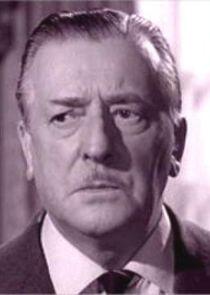
Geoffrey Sumner
His parents were Edmund and Kathleen Marion (Brook). He married Gwen Williams Roberts in 1967 after the death of his first wife, Mary Richards with whom he had three daughters.
In 1957 he played Major Upshot-Bagley in the first series of The Army Game, broadcast by ITV Granada. He reprised the role in the 1958 film I Only Arsked!, based on the TV series.
A sample of "Train Sequence" ("This is a journey into sound") from the 1958 LP A Journey Into Stereo Sound was used by different artists like Eric B. & Rakim in their track "Paid in Full", Bomb the Bass ("Beat Dis"), Public Enemy ("Welcome to the Terrordome"), Anthrax ("Potters Field"), Handsome Boy Modeling School ("Holy Calamity (Bear Witness II)"), Luke Vibert ("Ambalek"), Gotye ("A Distinctive Sound") and Jauz x Marshmello ("Magic").
In September 1968 Sumner played Sir Lancelot Spratt in the BBC radio series of Doctor in the House, alongside Richard Briers.
Biography from the Wikipedia article Geoffrey Sumner. Licensed under CC-BY-SA. Full list of contributors on Wikipedia.
Known For
Recently Updated Shows

The Creep Tapes
Based on a collection of videotapes in the secret vault of the world's deadliest and most socially uncomfortable serial killer, who hires his victims to film him for the day under false pretenses, each episode exposes a new victim from one of the fabled 'Creep Tapes'.

America's Funniest Home Videos
ABC's longest-running primetime entertainment show, America's Funniest Home Videos, returns for season 36 this fall with the same mission -- giving families something genuinely funny to enjoy together on Sunday nights.
"AFV," the longest-running primetime entertainment show in ABC history, returns for season 36 with the same mission - to provide viewers with hysterical moments that fly by at a dizzying pace.

The Real Housewives of Potomac
Just up the river from our nation's capital lies a hidden gem—Potomac, Maryland. Its rolling hills, gated mansions, sophisticated prep schools, and exclusive country clubs all serve to keep the area invitation-only. Sprinkled throughout this community are a handful of old-line, wealthy African-American families who have historically broken racial barriers to provide a life of privilege for their children. The Real Housewives of Potomac follows the upscale lives of six intriguing, well-to-do women: Gizelle Bryant, Katie Rost, Karen Huger, Charrisse Jackson-Jordan, Robyn Dixon, and Ashley Darby, all of whom have fought for their places in this society by way of legacy or marriage. In a town where entry is granted only through class, pedigree, and lineage, how far will these ladies go to secure their spot at the top of this prestigious circle?

The Traitors Canada
Follow a group of contestants – including some familiar faces – who live together as they complete a series of challenges with the goal of earning a cash prize. The catch? Some of the contestants are traitors who will attempt to deceive and manipulate their way to the prize instead of sharing it amongst the group. In this psychological adventure will the traitors be unmasked in time?


